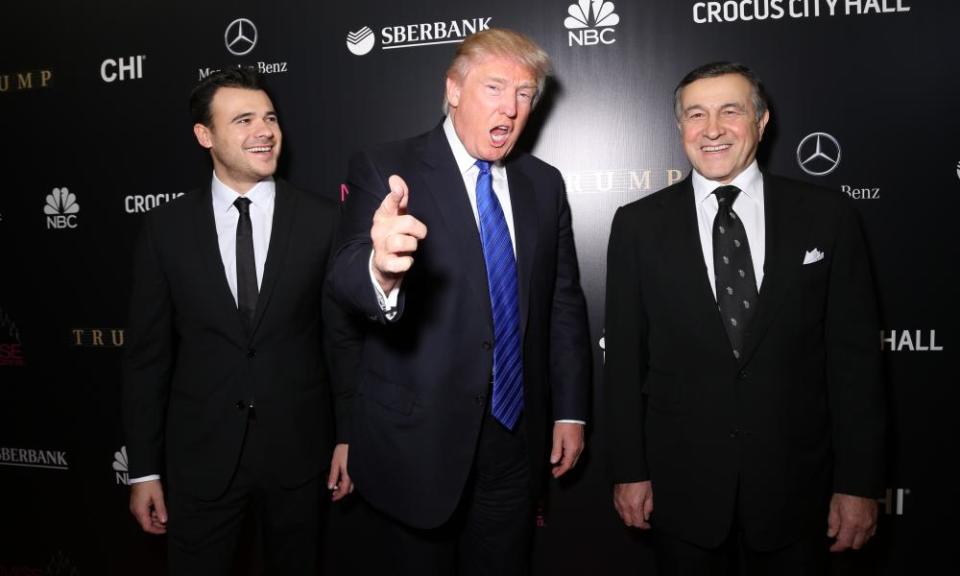Trump/Russia review: Le Carré meets Mario Puzo in Moscow and Manhattan

It’s probably a bad sign for the republic when the only way to write a plausible biography of the president of the United States is to make it read like a cross between The Godfather and Tinker Tailor Soldier Spy.
But that’s where we are in the age of Trump. As the number of books in this genre proliferates – from Collusion by Luke Harding of the Guardian to Russian Roulette by David Corn and Michael Isikoff and more – it’s getting harder and harder to shock a knowledgable (and therefore, numbed) reader. But with Trump/Russia: a Definitive History, Seth Hettena still manages a frisson of surprise from time to time.
For example, did you know that Michael Cohen was introduced to Trump by his Ukrainian father-in-law, who was convicted of a money-laundering-related crime, and that Cohen’s uncle, Morton Levine, owned a Brooklyn catering hall, the El Caribe Country Club, in which Cohen had a stake himself, and which was rented to the first Russian mafia boss of Brighton Beach?
Would you be surprised to learn that some of the earliest Russian mobsters in Brooklyn kept a fraudulent gasoline wholesale business thriving by aligning themselves with the Italian Colombo family – and that one of those Russians, David Bogatin, eventually earned enough from this racket to spend $5.8m on five different units in Trump Tower, the developer’s first important luxury apartment building in Manhattan?
When it went up (with ready-mix concrete from an Italian-controlled mob firm), Trump Tower was one of only two buildings in Manhattan that allowed buyers to be anonymous. This was when Trump got the habit of filling his pockets with the profits of criminals, by selling to everyone from the Cuban swindler Roberto Polo to the Haitian dictator Jean-Claude “Baby Doc” Duvalier.
A former state investigator told Hettena he was “90% sure” Russian buyers were “doing Trump a favor” by buying so many apartments in his building, but Trump’s connection to them was never investigated.
Hettena points out that Trump is hardly the first president to brush up against the mob – think JFK and Judith Campbell Exner, or Nixon and Bebe Rebozo – but Trump has broken new ground by being the first to benefit from his connections to so many mobsters tied to a foreign power. And as a Spanish anti-corruption prosecutor has noted, in Russia “one cannot tell the difference between the activities of the government and those of its organized crime groups” – because the mobs are actually controlled by the state’s security services.
“After the collapse of the USSR,” writes Hettena, Russia’s gangsters emerged “into the daylight” to “take their place in the new ruling class of the country … bureaucrats, spies, oligarchs and criminals” are part of a loose and constantly “shifting network of alliances”.
Like other investigators before him, Hettena, describes the astonishing web that connects the Russians who teamed up with Trump to bring the Miss Universe contest in Moscow to the notorious meeting at Trump Tower, where a motley crew of Russian conspirators offered Trump campaign officials dirt on Hillary Clinton.
It was the Azerbaijani mogul Aras Agalarov who paid Trump $20m to bring Miss Universe to Russia. Trump allowed Agalarov’s singer-son Emin to perform for 10 minutes on the Miss Universe telecast to promote his career in the west. Then it was Emin’s publicist, Rob Goldstone, who first contacted Donald Trump Jr to tell him Aras Agalarov had met with the Russian “crown prosecutor” (a non-existent position) and that they had agreed to offer the Trump campaign damaging information about his Democratic opponent.
There are so many instances of Russian-Trump collaboration it’s hard to keep track. Way back in 2002, Trump partnered with Sotheby’s International and a Moscow-based realty company to open an office to sell apartments in his new Trump World Tower in Manhattan. The apartments appealed to Russian oligarchs, “because if you were wealthy in Russia your money was never secure. Your money was only safe if and when it moved out of the country” – into something like a Trump condominium, which functioned for its owner like a safe deposit box.
Bloomberg Business Week found that two years later, one-third of the units on floors 76 through 83 of Trump World Tower had been sold to companies connected to Russia or neighboring states such as Ukraine and Kazakhstan.
Hettena also does the standard review of the contents of the Steele dossier, which describes many different contacts between Russians and Trump associates. He quotes experts who are skeptical of the most salacious allegation, concerning the prostitutes Trump allegedly met with in a $13,000-a-night suite at the Ritz Carlton in Moscow.
“Sex stuff comes up a lot and it’s often nonsense,” one Washington attorney who often hires private investigators told the author.
But I believe a novelist is better qualified than any lawyer or reporter to answer this question. And the novelist with the best credentials to evaluate the Steele dossier is undoubtedly John le Carré, the author of all the finest cold war thrillers, including Tinker Tailor Soldier Spy.
And Le Carré has said on NPR that he believes “it’s perfectly possible that Trump was taken into what I call a honey trap – that he had ladies found for him, and he misbehaved in Russia.”

 Yahoo News
Yahoo News 